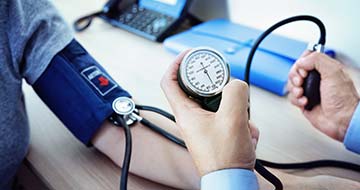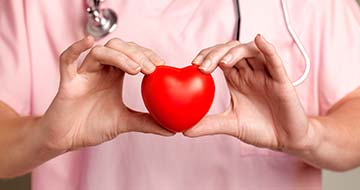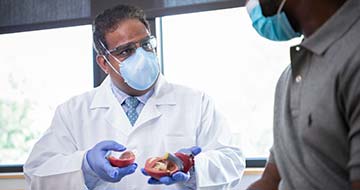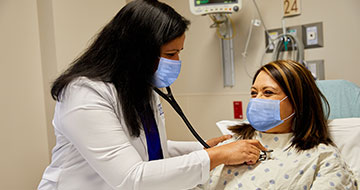Comprehensive Care for Your Heart
Your good health starts with a strong heart. If your heart is not working at peak performance, you may suffer symptoms that could affect the quality of your life. The good news is that many heart problems can be treated if detected early. At Good Samaritan
Medical Center, we aim to have you back on your feet with a healthier heart, more energy and improved stamina.
We have received accreditation from The Society of Chest Pain Centers, a non-profit organization created to help hospitals implement
the best standards in cardiac care. With some of the latest technology and updated techniques, we have been recognized for delivering efficient and effective heart care to patients experiencing chest pain.
What Does a Cardiologist Do?
A cardiologist is a heart doctor specializing in diagnosing and treating cardiovascular diseases. A heart specialist in West Palm Beach may carry out diagnostic tests and perform procedures such as angioplasty, heart catheterization or pacemaker insertion.
They also make decisions regarding a patient’s heart surgery and other treatments.
If you have symptoms of heart disease, your primary care doctor may refer you to a cardiologist to evaluate your symptoms and medical history. So,
if you experience the following symptoms, do not ignore them. They are your body’s way of telling you that something is wrong. Visit a cardiologist in West Palm Beach, FL for a checkup.
Heart attack symptoms
- Chest discomfort or pain
- Discomfort or pain in arm or shoulder
- Shortness of breath
- Nausea, lightheadedness or vomiting
Stroke symptoms
- Face drooping
- Arm weakness
- Speech difficulty
Cardiac arrest symptoms
- Sudden loss of responsiveness
- No normal breathing
Request a Cardiologist Referral
The cardiologist may recommend diagnostic tests to assess your condition, such as:
- Blood tests
- Catheter angiography
- Cholesterol checks
- Computed tomography (CT) scan
- Coronary angiography
- Electrocardiogram (ECG)
- Exercise stress test
- Heart positron emission tomography (PET) scan
- Heart screening
- Magnetic resonance imaging (MRI)
- MR angiography
- Vascular ultrasound
- Venography
Depending on the diagnostic test results, your cardiologist may manage your condition using medicines or other non-invasive treatments. If these treatments do not work, your cardiologist may refer you to a cardiovascular surgeon, a doctor who performs
surgery on the heart, blood vessels and lungs. You will remain in your cardiologist’s care throughout your heart treatment.
Here are some of the conditions our cardiologists can help you with:
- Acute coronary syndrome – blood supply to the heart is suddenly blocked, resulting in a heart attack, unstable angina or another medical emergency
- Angina – chest discomfort or pain caused by insufficient oxygen-rich blood reaching the heart
- Arrhythmia – change from the heart’s typical electrical impulse sequence, resulting in irregular heartbeat or rhythm
- Atherosclerosis – the buildup of fatty deposits (plaque) in the arteries, narrowing the arteries and reducing blood flow
- Atrial fibrillation (AFib) - a type of arrhythmia wherein the heart’s upper and lower chambers are not coordinated
- Cardiac arrest – the heart suddenly stops pumping
- Cardiomyopathy – a heart disease that makes it harder for the heart to pump blood to the entire body efficiently
- Congenital heart defects – heart defects present at birth
- Coronary artery disease – narrowing or blockage of the coronary arteries
- Heart attack – happens when the flow of oxygen-rich blood to the heart suddenly becomes blocked
- Heart block – a type of arrhythmia characterized by the interruption of the electrical signal from the heart’s atria to the ventricles
- Heart failure – the heart is not pumping as efficiently as it normally should
- Infective endocarditis – a bacterial infection in the heart’s inner lining
- Inherited rhythm disorders (IRDs) – inherited arrhythmia that may cause heart-related complications to an individual
- Long QT syndrome (LQTS) – an inherited heart problem affecting the heartbeat
- Pericarditis – the inflammation of the pericardium, the heart’s sac-like covering
- Valve disorders – happen when one or more heart valves do not close or open properly
Why Do I Need To See a Cardiologist?
A person who does not experience any heart disease symptoms may benefit from seeing a heart doctor in West Palm Beach, especially people who have these risk factors:
- Clinical depression
- Diabetes
- Excessive drinking
- Family history of heart disease
- High cholesterol levels
- Physical inactivity
- Smoker or former smoker
- Starting a workout program
- Pre-eclampsia
Do Cardiologists Perform Surgery?
Cardiologists do not perform surgery. Some cardiologists may undergo additional training to perform specialized procedures such as placing stents to open clogged arteries, inserting specialized devices, performing ablation procedures for different heart
problems and more.












